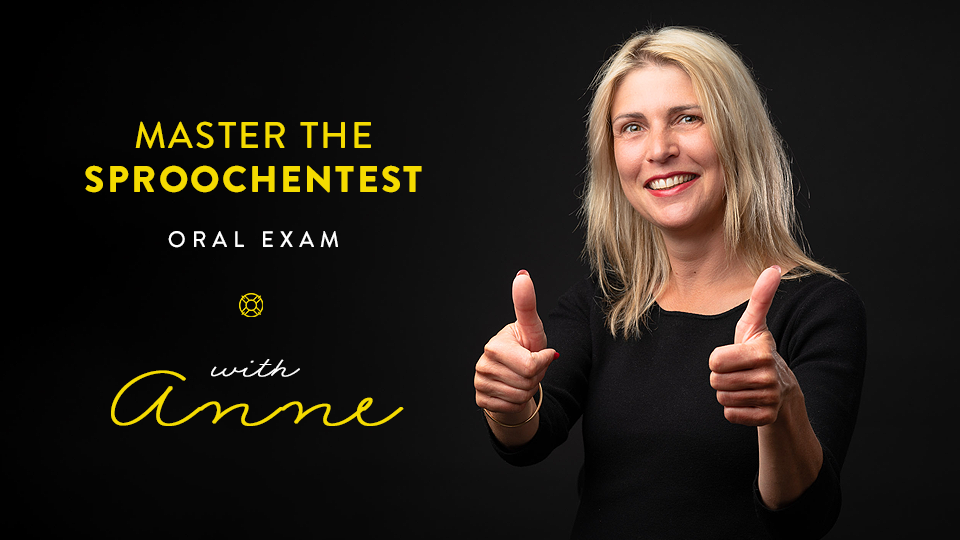In this lesson I will concentrate on tricky questions an examiner might ask you in a speaking test, especially the oral exam of the language test called Sproochentest.
In a speaking test the examiner will ask you many questions to test your language and you will need to show off your vocabulary range and develop a short answer. But … for some questions you don’t have an answer immediately. And your first reaction might then be:
Ech weess net ….
Let’s look at 3 of those tricky questions you may get especially in an Level A2 speaking test. I will concentrate on the topic Gesondheet. But you can apply this kind of questions to any topic.
Fro: Wat mengt Dir: sinn Hausdéiere gutt fir d’Gesondheet?
Äntwert: Ech weess net ….
Fro: Firwat hu vill Leit en Hausdéier?
Äntwert: Hmm, ech weess net ….
Fro: Wéi informéiert Dir Iech iwwer d’Gesondheet?
Äntwert: Euh, ech weess net ….
Difficult questions, right? So in this lesson we will look at some better ways to answer them, using something different than ech weess net and I will help you with some pronunciation tips to build your fluency. With all this you will have the best chances to get a higher score in a speaking test.
The kind of questions above are quite common and can be tricky and usually request a bit more time to think. But in a test you don’t have too much time, right.
However, you can gain time and show off some great vocabulary by using some short phrases to start your answer. These phrases are also good fillers that can help give you more time to think and start developing a better answer.
Whilst the following phrases are really good, don’t just learn them today and try using them in a speaking test tomorrow. You need to be practicing them a lot so that you can use them confidently and naturally. Otherwise it’s not gonna work.
Wat mengt Dir: sinn Hausdéiere gutt fir d’Gesondheet?
1. Ech sinn net (esou) sécher – I’m not (too) sure
Ech sinn net sécher, fir éierlech ze sinn, mee ech mengen, Hausdéiere sinn ..… I’m not too sure, to be honest, but I think, pets are …..
Let’s break it down :
- Ech sinn net sécher or you can say ech sinn net esou / sou sécher –
and then you can add the filler
- fir éierlech ze sinn …. – to be honest
Repeat several times: ech sinn net sou sécher, fir éierlech ze sinn ….
Then you can continue with
- mee ech mengen … – but I think …
2. Ech géif soen – I would say
Ech sinn net sécher, mee ech géif soen, allgemeng sinn Hausdéiere gutt fir eis Gesondheet, zum Beispill …. I’m not sure, but I would say, generally speaking pets are good for our health, for instance ….
Let’s break it down :
- mee ech géif soen this is a great chunk which you can also use when describing a picture which is also part of a speaking test
Repeat several times: ech sinn net sou sécher, mee ech géif soen….
- allgemeng or you can say am Allgemengen – generally speaking
Listen to the pronunciation: allgemeng / am Allegemengen
And then it is also a good idea to develop your answer by giving some examples by saying:
- zum Beispill – for example
Now you can probably see what I am doing here: by making this ech weess net quite long, I give myself time to think, so hopefully by the time I get to zum Beispill my brain has been ticking over and I’ve got something to say.
☞ Over to you: Try to answer aloud the question “Wat mengt Dir: ass et gutt fir d’Gesondheet en Hausdéier ze hunn?” by using these new chunks.
Firwat hu vill Leit Hausdéieren?
3. Dat ass eng gutt Fro, awer ech … – That’s a good question, but I ….
Dat ass eng gutt Fro, awer ech huelen un, Hausdéieren halen d’Leit fit an hëllefe Stress ofbauen. That’s a good question, but I guess, pet skeep people in a good shape and help to reduce stress.
Let’s break it down
- Dat ass eng gutt Fro – nice way to gain time and to start your answer
and then you add immediately this filler
- awer ech huelen un or you can say ech supposéieren – I guess / suppose
and instead of always saying mee use awer
Repeat several times: dat ass eng gutt Fro, mee ech huelen un
☞ Over to you: Try to answer aloud the question “Firwat hu vill Leit Hausdéieren?” by using these new chunks.
Wéi informéiert Dir Iech iwwer d’Gesondheet?
4. Dat hänkt of – That depends
Dat hänkt of. Engersäits, liesen ech interessant Artikelen op Internet, anerersäits schwätzen mat Frënn oder mat mengem Dokter iwwer d’Theema. That depends. On the one hand I read interesting articles on the internet and on the other hand I speak with friends or with my doctor about the topic
Let’s break it down and have a look at the pronunciation
- Dat hänkt of – that depends on
- engersäits …. anerersäits – on the one hand … on the other hand
this may be quite tricky to pronounce that’s why you should practice it before using it.
Repeat several times: Dat hänkt of. Engersäits ….. anerersäits
- ☞Over to you: Try to answer aloud the question “Wéi informéiert Dir Iech iwwer d’Gesondheet?” by using these new chunks.
I hope this has been helpful. Thank you for watching and for practicing with me.
You can watch this video on Youtube to practice your pronunciation & listening skills.
Let’s practice!
Übung 1
Complete the sentences:
- Dat _______ of. Engersäits kann ech interessant Artikele liesen, ___________ kann ech mat menger Famill iwwer d’Gesondheet schwätzen.
- Ech sinn net _______ sécher, fir _____________ ze sinn, ________ ech mengen en Hausdéier kann hëllefen gesond ze bleiwen.
Übung 2
Answer the following question: write your answer by using the phrases you have learnt today!
Wat mengs du: maache Computeren eist Liewe méi einfach?
Write your answer and ….
Check the different solutions by downloading the PDF!
Get the PDF!
With the online course Master the Sproochentest Oral Exam I share strategies, top tips and the experience I have gained over the years so that you can benefit of it, gain confidence and achieve your best score at the Sproochentest’s oral exam.
The 50-Day-Study-Plan shows you exactly what you should study, when you should study and how to get ready in 6 weeks with this self-paced online course.
The most flexible approach to Sproochentest preparation:
Study in any location, at any time and always at your own pace!
This course will help you strengthen and practice both your pronunciation and speaking skills.
ENROLL NOW!





